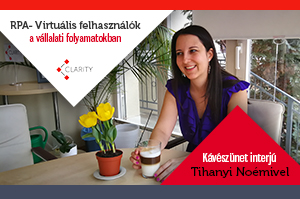News
Coffee Break Interview with Noémi TIHANYI

Noémi TIHANYI
RPA – Virtual Users at Corporate Processes
Reading time: 4 minutes
We’re launching a new series to introduce our colleagues’ special fields in their work and occasionally their hobbies in their free time.
In our first session, we have an easy job because work is also a hobby in Noémi’s life, at least we see it based on her enthusiasm.
Clarity Process management has been your field for many years, but now you’re dealing with a new approach, which will change the processes and operations of companies soon. What is actually RPA?
Noémi RPA (Robotic Process Automation) is a new area of process automation technologies. It’s about how to replace human resources with virtual users (robots, bots) in time-consuming, costly, monotonous or problematic processes. We’re talking about a virtual workforce, which is much needed nowadays.
Clarity Why is Robotic Process Automation so current?
Noémi Because it’s no longer science fiction, it’s the daily reality of organizations. Robots are more widespread abroad, but some RPA systems are already present at our major customers in Hungary - mainly from market-leading suppliers.
According to our experience, RPA has huge popularity and results are very spectacular where it appears. Employees enjoy the transfer of monotonous or unpredictable tasks, IT enjoys the technological novelty and the improved data quality, and managers enjoy savings. In the coming years, this market can be expected to jump very much - in 2016 the RPA market reached only $250 million and it will jump to $2.9 billion by 2021 according to Forrester's research.
Clarity What does RPA offer us, which is already a reality and available for organizations?
Noémi First, you can achieve an amazingly fast, massive digitization leap in a small area, e.g. in customer service, data processing, data service, and more. An RPA robot can do everything that can be programmed. It can apply the same IT systems as a real user working, for example, in the administrative field - logging in to multiple applications, filling out a form, counting, copying, reading and writing emails, decision making along the algorithm. It’s just much faster, without error, 24 hours a day and always along the same processes.
Clarity Company management systems have already existed that helped the work of employees. What’s more?
Noémi RPA connects a series of convergent technologies, such as OCR, rule engines, text mining, workflow scheduling. This tool helps the company to automate subprocesses that are critical (e.g. when it’s risky to misspell a record), requires the automation (e.g. high-volume and resource demanding), or requires the continuous availability, but they have not been able to reduce their manuals for some reason (e.g. it would have been expensive to develop into an existing system). The automation of subprocesses goes without changing the current application portfolio and costly integrations for the company. An RPA digitizes on existing systems, not instead of them. And it works independently, even without human intervention.
Clarity Do you think the human work is going to be unnecessary and we can entrust everything to robots?
Noémi Surely not. ? RPA does not fit for all. But when it does, it can reach 50-80% efficiency improvement in a given process. It’s an incredible number, so as soon as we say it and it’s proven to be true, the organization suddenly wants to robotize everything. ? But not everything can be robotized – an RPA robot will never think, make a decision independently and “find out things”.
Clarity And what can we entrust to robots that are already available for us?
Noémi Almost everything, the question is what it is worth. It is worthwhile to build on processes that currently work with great manuals, their volume is significant, but they work with well-structured data and logic, and continuous operation comes in handy. So, you can generate revenue, cost reduction or better customer service. Another aspect can be an unpredictable (seasonal) resource demand or a critical process of compliance. But of course, there are thousands of aspects to be taken into account in order to target well.
Clarity Could you tell us some practical implementations?
Noémi There are typical sectoral and management fields: bank account, debit/credit card management and credit assessment in the financial sector; offer and commission processing areas in insurance; data providing and reporting fields in public administration; order management in telecommunication; reading and billing areas in public utilities. These are the typical RPA-capable process elements. Also, customer service and reporting are relevant in almost every case.
Clarity And what are the tools to choose?
Noémi Almost all the major suppliers have RPA solutions and there are domestic developments too. In our experience, the leading products in Forrester Wave analysis are typical in Hungary, such as UIPath, Blue Prism and Automation Anywhere.
Clarity How can we help our customers to apply process robotization if they consider it?
Noémi On one hand, our existing - classical - process development work is done ‘with RPA eyes’, we think this is the future. Traditional tools cannot compete with the robots’ efficiency increasing capabilities. On the other hand, we can help to choose which processes requires RPA based on our own methodology. This is an important decision we can help to make. Of course, we can support the implementation, plan and introduce a robot and reveal market-leading tools.
Clarity Thank you, Noémi, for the short introduction!
Please don’t hesitate to contact Noémi to ask for more information via email!
